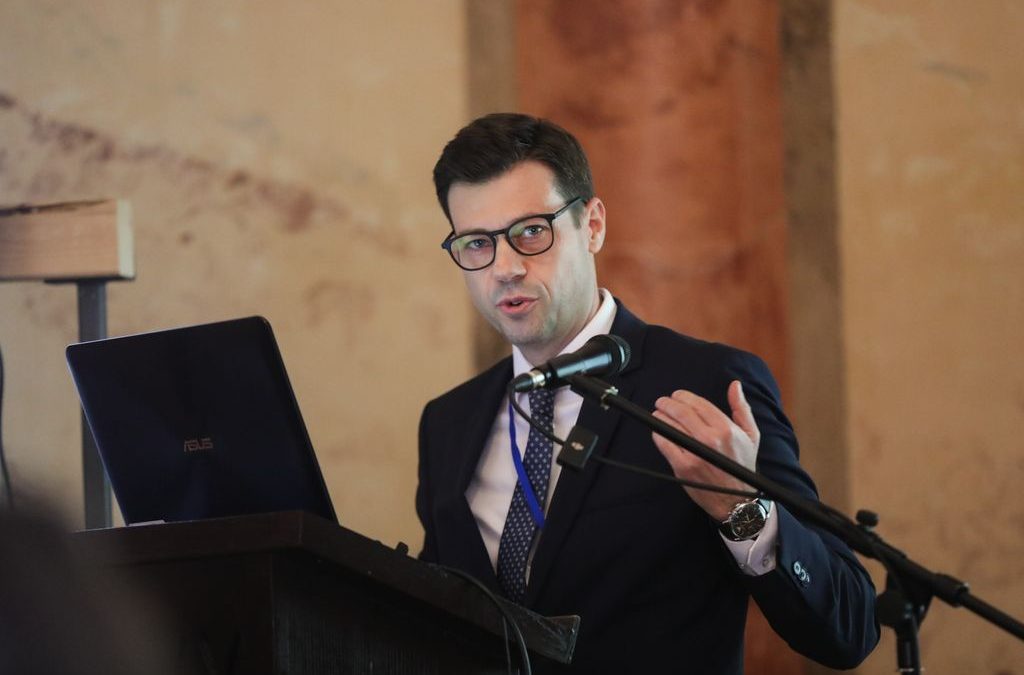photo by: Molcsányi Máté (kisalfold.hu)
This conference is being organized by the Research Group on Religion and Science at Széchenyi István University, our Society, and the Saint Maurus Benedictine Priory in honor of Fr. Stanley Jaki’s work on 4 April 2025 in Győr. The following is an extract of the opening speech given by András Tóth in English:
This conference has been organised in the spirit of Father Jáki. The title „The Savior of Science” expresses this, because it is a very characteristic reflection of Father Jáki’s point of view. Father Jáki was a Catholic priest, Benedictine monk and scientist. Together, these give Father Jáki a dominant identity and perspective. This is what I would like to talk about here in the neighbourhood of the monastery in Győr where he was formed. Through Jáki’s Catholicism, his science, and his Benedictine character, I would like to show what it means to salvation of science.
First, salvation has a strong Catholic perspective. At the centre of Salvation is Jesus and his incarnation. How does science relate to Jesus? As a Catholic and as a scientist, Father Jáki makes this connection. It is important to remember this because we do not necessarily live our Catholic lives as scientists. In this case, it is sufficient to know that science, although it aims to understand and reveal reality, does not answer the most fundamental questions of human beings: the meaning of life and death, the fundamental values.[1] Science can therefore never be exclusive and sufficient for a Catholic in the search for the way of salvation. As Jesus points out to the Samaritan woman: „Yet a time is coming and has now come when the true worshipers will worship the Father in the Spirit and in truth, for they are the kind of worshipers the Father seeks.” (Jn, 4:22)
Second, as a scientist, Father Jáki points out that science, in its activity of discovering reality, ultimately points to God. The salvation of science is the realization that truth is fulfilled in Jesus (Jn 1:14-16) “The Son is the image of the invisible God, the firstborn over all creation.For in him all things were created: things in heaven and on earth, visible and invisible, whether thrones or powers or rulers or authorities; all things have been created through him and for him.” (Col 1:15-16) All authority in heaven and on earth has been given to Jesus (Matthew 28:18), and „For God was pleased to have all his fullness dwell in him, and through him to reconcile to himself all things, whether things on earth or things in heaven” (Col. 1:19). Father Jáki’s work shows with unbroken enthusiasm that behind the revelations of science – as St. Paul writes through all that is created – the “eyes of the mind” can come to know God. (Rom 1:20) If God created the heavens and the earth and ordained their uniform laws (Psalm, 148:6) then it is his fingerprints must be shown in the reality revealed by science. What is this reality? Father Jáki points out that at several moments in the work of creation there are fine tunings which suggest that the purpose of creation was the bringing forth of life
Third, according to Fr. Jáki, monasteries are places of creation.[2] Not in some modern programmatic sense, but in the sense that using their intelligence and skills to care for and develop creation in accord with God’s plan.[3] According to Fr. Jaki, the object of God’s creative work is the “all” (totum per partes). As Catholics we confess that the Father, the Son and the Holy Spirit exist in an eternal community of love. (John, 17,24) God exists by relations.[4] Imago Dei is that we are created for relationships with God and with each other. The laws of the world as revealed by science demonstrate in numerous ways the hand of the Trinitarian God who created it.
Fr. Jáki teaches us that if we do science as Catholics, we must look for the hand of the Creator, in the realities we uncover. This approach offers the salvation of science.
[1] Fides et ratio, 88.
[2] Jaki, Stanley L. “Creation and Monastic Creativity.” Monastic Studies (Toronto), vol. 16, Christmas 1985, pp. 79–92.
[3] John Paul II, Encyclical Letter Veritatis Splendor (6 August 1993), pars. 38-39: AAS 85 (1993), 1164-1165.
[4] AI Research Group of the Centre for Digital Culture. Encountering Artificial Intelligence: Ethical and Anthropological Investigations. Pickwick Publications, 2024., 54.
